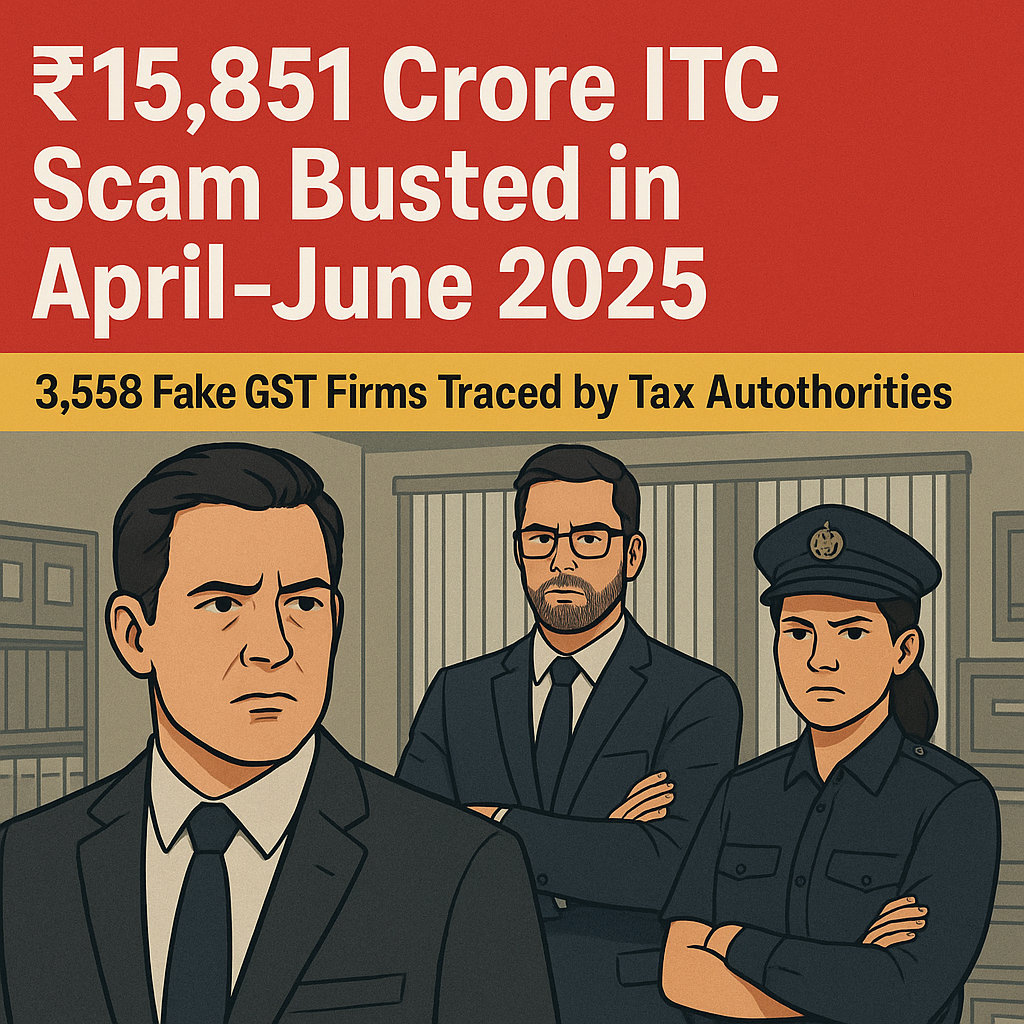Between April to June 2025, GST authorities across India uncovered fraudulent worth ₹15851 crore ITC Scam . This scam, detected in just three months, involved over 3,558 fake firms issuing bogus GST invoices without any actual supply of goods or services.
This major enforcement operation is one of the largest ITC fraud detections since the rollout of the Goods and Services Tax in 2017.
Table of Contents
How the ₹15851 Crore ITC Scam Worked
According to the Ministry of Finance and GST Intelligence sources, the scam followed a typical ITC racket model:
- Fraudsters created fake GST registrations using forged Aadhaar cards, PAN cards, and utility bills.
- These bogus firms operated with no actual business activity—no office, no stock, no transport, and no employees.
- They issued fake GST invoices to each other, or to real businesses, to inflate turnover and pass on ineligible ITC.
- These invoices were used by real companies to claim input credit, reducing their actual GST liability illegally.
- The scam was structured through multi-layered networks across states, with goods like scrap, chemicals, fabric, electronics, mobile accessories, and construction materials being commonly mentioned.
States Where Major Fraud Was Detected
The operation revealed a widespread pattern across major business states:
- Delhi NCR – Paper trading, mobile accessories, and hardware supplies
- Gujarat – Metal scrap, yarn, and packaging materials
- Maharashtra – Petroleum-related products and industrial chemicals
- Tamil Nadu – Electrical cables and textiles
- West Bengal – Plastic granules, food additives, and rubber goods
- Uttar Pradesh – Cement, fly ash bricks, and hardware items
Sample of Fake Firms Traced
| Fake Firm Name | Registered Location | Goods Claimed |
|---|---|---|
| RP Traders | Delhi | Electrical components |
| Omshiv Polymers Pvt Ltd | Gujarat | Plastic granules |
| Shree Ram Trading Co. | Maharashtra | Lubricants and chemicals |
| Lakshmi Steels and Cables | Tamil Nadu | Copper wires and steel rods |
| SkyTouch Textiles | West Bengal | Fabric and garments |
These entities were created for the sole purpose of invoice rotation and tax fraud.
Action Taken by GST Department
Tax authorities have responded with swift enforcement actions:
- Over 500 raids and verification drives conducted across India.
- More than 3,000 GST registrations suspended or canceled.
- 65+ arrests made so far, including fake directors and intermediaries.
- Bank accounts and movable/immovable property frozen under Section 83 of the CGST Act.
- Rule 86A invoked to block ineligible ITC in suspicious cases.
Relevant Sections Invoked Under GST Law
- Section 132 – Prosecution for tax fraud and willful misstatement
- Section 122 – Penalty for issuing invoices without supply
- Section 67 – Search and seizure
- Section 83 – Provisional attachment of property
- Rule 86A – Blocking of fraudulently availed ITC
- DRC-01A – Pre-show cause notice intimation to recipients of fake ITC
Penalties and Consequences
- Up to 5 years imprisonment for masterminds
- 100% penalty on fraudulent ITC claimed
- Genuine buyers dealing with such fake suppliers may also face ITC denial, reversal, or audit scrutiny
Why This Matters to Honest Businesses
Even if you are a compliant business, your ITC can be denied if:
- Your supplier is found to be a fake firm
- There is no proof of goods received or transport
- GSTR-2B vs GSTR-3B mismatch arises
- The invoice lacks proper e-way bill or payment trail
Several courts, including the Madras High Court, have ruled that taxpayers must be given an opportunity to explain their position before any ITC reversal is enforced. However, prevention is always better than cure.
How to Protect Your Business from ITC Risk
- Verify every supplier’s GSTIN on www.gst.gov.in
- Reconcile GSTR-2B and 3B monthly
- Keep delivery proof, transporter invoices, and e-way bills
- Check if suppliers are filing regular returns and not newly registered with no transaction history
- Avoid transactions that seem too good to be true
Final Thoughts
The ₹15,851 crore GST ITC scam is a stark reminder that India’s indirect tax system is still vulnerable to misuse, despite technological controls. The government is now leveraging AI-based tools, data analytics, and integrated e-way bill systems to catch fraudsters in real time.
Legitimate businesses must stay alert and follow best practices in vendor onboarding, transaction documentation, and GST compliance. A single fake invoice can result in heavy penalties—even for honest taxpayers.
Visit taxgiveindia.com for filing returns with accuracy
